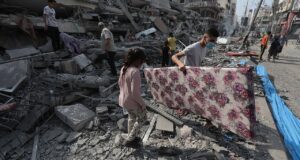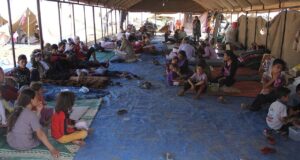February 28th, 2016
There is no room for moderation in extremism and no room for genuine reform in a theocracy led by religious fascists.
On Friday, millions of Iranians voted in the country’s first so-called “election” since a deal with world powers over the nuclear programme and the lifting of sanctions. They were electing a new parliament and Assembly of Experts, a clerical body that appoints the Supreme Leader.
Preliminary results indicate that loyalists of President Hassan Rouhani are leading the race and former President Akbar Hashemi Rafsanjani and Rouhani himself are in the top two spots for the Assembly of Experts in Tehran.
The so-called “election” was widely hailed as a victory for the reformists and moderates by international media outlets. What has widely been ignored, however, is the fact the real reformists and moderates were never on the ballot box. The Islamic Guardian Council, under the leadership of Ayatollah Khamenei, had decided well in advance who may or who may not run and disqualified genuine reform candidates based on discriminatory and arbitrary criteria, including many women.
Let us be clear: what happened in Iran on Friday was no election. It was a voting exercise with the sole purpose to legitimise the rule of the all powerful religious establishment, which considers the citizens of Iran their private property. And Hassan Rouhani is many things, but a moderate and reformist he is not.
In fact, since he assumed office in 2013, human rights conditions in the country have steadily deteriorated due to an intensified and systematic campaign of harassment, imprisonment, torture, and killing of minorities, including Jews and Christians, Baha’is, Sunni and Sufi Muslims, Shi’a dissidents, atheists, homosexuals and converts.
Every year, Iran carries out hundreds of executions. In 2015, the regime executed 966 people for various crimes, including 21 for moharebeh (insulting Mohammed), according to the Iran Human Rights Documentation Centre. The Kurdish minority faced acute persecution due to rising aspiration for independence across the region. For example, well-known Kurdish activist Mansour Arvand was hanged in June 2015 without notice.
Iranian authorities also cracked down on journalists for speaking out against the Rouhani regime and prominent human rights activists had to flee the country for defending members of the Baha’i and Christian community.
The Baha’i community, Iran’s largest non-Muslim religious sect, deemed heretics by the regime, remains a particular target of discrimination. They are subject to property confiscation, banned from university, cannot establish or operate their own places of worship, and face acute discrimination in the social and political sphere. As of last year, more than 100 Baha’is were imprisoned solely on grounds of their religious beliefs.
The Christian community in Iran suffers a similar fate. At least 90 Christians are currently either in prison or awaiting trial, which often fail to meet international standards, because of their religious beliefs and activities. On Christmas Day 2014, eleven Christians, including the former pastor of the Assyrian Pentecostal Church in Tehran, were arrested by Iranian security forces for practicing freedom of religion. Some of them remained in custody until March 2015.
The minority Sunni Muslim community also faces harassment and discrimination because followers of non-Shi’a denominations are deemed not true Muslims by the mullah regime. At least 150 Sunni Muslim prisoners of conscience are on record. Moreover, Sunni Muslims are prohibited from building new places of worship and are banned from teaching Sunni Islam in schools. Since Rouhani took office, the Iranian regime has also imposed harsh prison sentences on prominent reformers from the Shi’a community.
The Supreme Leader continues to incite violence against the country’s Jewish community and propagates anti-Semitic rhetoric. Iran has the largest Jewish population outside of Israel in the Middle East. Last year, the country hosted a Holocaust denial cartoon contest in response to the terrorist attack on the satirical magazine Charlie Hebdo. Another such event is planned this year.
And then there is Iran’s support for its terror proxy Hezbollah. The Shi’a militia is currently busy waging jihad in Syria on behalf of Bashar al-Assad’s mass-murdering regime. There is a high probability that Iran’s sponsoring of Hezbollah and other terrorist entities will increase notably after money kicks in from the sanctions relief.
Yes, the international media is correct. Moderates have indeed won the election in Iran. That is if you define moderates as people who support and sponsor terrorists and their activities, treat women as second class citizens, hang homosexuals for loving someone of the same sex, and imprison religious minorities for the crime of not adhering to totalitarian beliefs.
Those of us, with a moral compass still intact, rather call it a sham election initiated by religious fascists with the sole purpose to consolidate power for the mullahs’ reactionary, criminal, inhumane, and gender apartheidist regime.
 Human Security Centre Human Rights and International Security Research
Human Security Centre Human Rights and International Security Research



